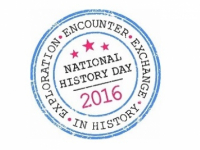National History Day (NHD) is a great program to help students in grades 6-12 practice research and critical thinking skills, elements important to their future in the workplace and school. For students and teachers particularly interested in local history, or who live far from HSP and want to find primary-source documents close to home, a small repository may be a good place to do research. Below, see a couple of small repository collections we highlighted that relate to the NHD 2016 theme of "Exploration, Encounter, Exchange."
Also- don't miss the citywide kick-off program for NHD Philly, being held tonight from 4:30 - 7:00 pm, for the fifth year in a row at HSP. At the kick-off event, teachers are invited to learn what NHD is and how it aligns with Pennsylvania Core Standards, and to meet with representatives from over twenty of Philadelphia's cultural institutions who will share their resources for student research. Event details here.
Don't forget about the small repositories! See below for two excellent collections we've "encountered" that document topics fitting with this year's NHD theme of "Exploration, Encounter, Exchange."
First person to travel the entire Great Wall of China?
Doylestown Historical Society. William Edgar Geil papers, 1886-2013 (bulk 1900-1910).
- Often referred to as "America's Forgotten Explorer," William Edgar Geil (1865-1925) was an evangelical missionary and international explorer from Doylestown, Bucks County, Pennsylvania who was most likely the first individual to travel the entire Great Wall of China (in 1908). He was a sought-after lecturer and orator; authored 10 books, including his best-selling travelogue The Great Wall of China(Sturgis & Walton Company, 1909); and was an accomplished photographer whose work documented vanishing cultures. The William Edgar Geil papers, 1886-2013 (bulk 1900-1910), include nearly 2,000 photographs; book preparation materials covering all phases of the editorial process; diaries and field notes; personal correspondence; newspaper clippings; and artwork. The collection documents William E. Geil's extensive travels, his work as an evangelist and missionary, and his family. To learn more about the William Edgar Geil papers, contact the Doylestown Historical Society by visiting its website at http://www.doylestownhistorical.org/, emailing info@doylestownhistorical.org, or calling (215) 345-9430. Click here to view the finding aid for this collection.
United States Navy Veteran who traveled to China and helped to open trade with Asia
Andalusia Foundation. Biddle family papers, 1747-2011.
- One of Philadelphia's well-known families, the Biddle family, boasts bankers, military heroes, politicians, lawyers, and philanthropists as its members. Several Biddle family members were prominent among their contemporaries and to history, including Commodore James Biddle (1783-1848), who served in the Navy for decades and worked to open up trade with Asia. The Biddle family papers, 1747-2011, consist largely of original manuscript documents from a number of Biddle family members. The largest portion of the collection consists of materials that belonged to Commodore James Biddle (1783-1848), who served in the United States Navy for forty-eight years. His papers include sixteen bound volumes of letters and miscellaneous documents. In addition, there are: newspaper clippings; letterbooks and journals; copybooks providing information in preparation for his voyage to China; logbooks, including one from the ship, Columbus; a silhouette; Mandarin calling cards; and other miscellaneous letters and documents. To learn more about the Biddle family papers, contact the Andalusia Foundation by visiting its website at http://www.andalusiapa.org/ or calling (215) 245-5479. Click here to view the finding aid for this collection.
More Ideas
To find other collections that relate to this year’s theme, and to get a better sense of the types of collections held at small repositories, HCI-PSAR staff have created an easily navigable subject guide. For descriptions of other archival collections uncovered during the HCI-PSAR project, we recommend browsing the HCI-PSAR finding aids website, hosted by the Philadelphia Area Consortium of Special Collections Libraries. There, you can view all of the archival collections at the small repositories that have participated in our project. Finding aids are being added to both the subject guide and finding aids website on an ongoing basis, so check back frequently.
You can also see what small repositories are in your area by browsing an interactive map of participating HCI-PSAR small repositories.
Keep in mind that staffing and resources vary at small repositories, so students may not get the same level of assistance and support that they would receive at the Historical Society of Pennsylvania. However, some small repositories do have professional staff members, many are "staffed" by volunteer retired teachers, and several are even hosting pre-service teachers to create lesson plans with primary-source documents as part of the National Archives' Cultural Collaboration Fieldwork Initiative.
HCI-PSAR staff hope that these resources will prove helpful in familiarizing teachers and students with the many small historical societies and sites that can be found in the Philadelphia area, and the important archival collections and primary-source materials that they hold!

